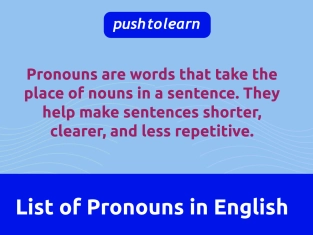by PushtoLearn
Partes de la oración en inglés
Tabla de contenidos
- Ejercicios de Partes de la Oración
- 📌 Las 8 Partes de la Oración
- 1️⃣ Sustantivos – Personas, Lugares, Cosas e Ideas
- 2️⃣ Pronombres – Reemplazando Sustantivos
- 3️⃣ Verbos – Acciones y Estados
- 4️⃣ Adjetivos – Describiendo Sustantivos
- 5️⃣ Adverbios – Describiendo Verbos, Adjetivos y Otros Adverbios
- 6️⃣ Preposiciones – Mostrando Relaciones
- 7️⃣ Conjunciones – Conectando Palabras e Ideas
- 8️⃣ Interjecciones – Expresando Emociones
- FAQ
Ejercicios de Partes de la Oración
Estos ejercicios se enfocan en Partes de la Oración.
📌 Las 8 Partes de la Oración
|
Parte de la Oración |
Función |
Ejemplos |
|
Sustantivo (Noun) |
Nombra a una persona, lugar, cosa o idea. |
dog, London, happiness, book |
|
Pronombre (Pronoun) |
Reemplaza un sustantivo. |
he, she, it, they, you, we |
|
Verbo (Verb) |
Muestra una acción o un estado. |
run, eat, is, have, jump |
|
Adjetivo (Adjective) |
Describe un sustantivo. |
happy, big, blue, fast |
|
Adverbio (Adverb) |
Describe un verbo, adjetivo o adverbio. |
quickly, very, well, slowly |
|
Preposición (Preposition) |
Muestra la relación entre palabras. |
in, on, at, under, with |
|
Conjunción (Conjunction) |
Conecta palabras, frases u oraciones. |
and, but, because, or |
|
Interjección (Interjection) |
Expresa una emoción fuerte. |
wow, oh, ouch, hey |
📌 Consejo: Algunas palabras pueden pertenecer a más de una parte de la oración dependiendo de cómo se usen.
✔️ Ejemplo:
-
I love fast cars. (adjetivo)
-
He drives fast. (adverbio)

1️⃣ Sustantivos – Personas, Lugares, Cosas e Ideas
🔹 Tipos de Sustantivos:
✔️ Sustantivos Comunes – book, city, car
✔️ Sustantivos Propios – Harry Potter, London, Toyota
✔️ Sustantivos Abstractos – love, happiness, freedom
✔️ Sustantivos Contables – apple, chair, idea
✔️ Sustantivos Incontables – water, air, information
✔️ Ejemplos:
-
This book is interesting. (Cosa)
-
Paris is a beautiful city. (Lugar)
-
Love is important. (Idea)
📌 Error común:
❌ I have many informations.
✅ I have a lot of information.
2️⃣ Pronombres – Reemplazando Sustantivos
✔️ Tipos de Pronombres:
-
Pronombres de Sujeto → I, you, he, she, it, we, they
-
Pronombres de Objeto → me, you, him, her, it, us, them
-
Pronombres Posesivos → mine, yours, his, hers, ours, theirs
-
Pronombres Reflexivos → myself, yourself, himself, herself, itself, ourselves, themselves
✔️ Ejemplos:
-
She is my best friend. (Pronombre de Sujeto)
-
This book is mine. (Pronombre Posesivo)
📌 Error común:
❌ Me and Sarah went to the park.
✅ Sarah and I went to the park.
3️⃣ Verbos – Acciones y Estados
✔️ Tipos de Verbos:
-
Verbos de Acción → run, dance, eat
-
Verbos de Estado → be, know, believe
-
Verbos Auxiliares → am, is, are, have, do, will
-
Verbos Modales → can, should, must
✔️ Ejemplos:
-
She runs every morning. (Acción)
-
He is very kind. (Estado)
📌 Error común:
❌ He can to swim.
✅ He can swim.
4️⃣ Adjetivos – Describiendo Sustantivos
✔️ Ejemplos:
-
The sky is blue.
-
She has a beautiful dress.
✔️ Orden de los Adjetivos:
(Opinion → Tamaño → Edad → Forma → Color → Origen → Material → Propósito)
✅ A beautiful small old round red Italian wooden coffee table.
📌 Error común:
❌ She has a red big car.
✅ She has a big red car.
5️⃣ Adverbios – Describiendo Verbos, Adjetivos y Otros Adverbios
✔️ Tipos de Adverbios:
-
Modo (¿Cómo?) → quickly, slowly, badly
-
Lugar (¿Dónde?) → here, there, everywhere
-
Tiempo (¿Cuándo?) → now, soon, yesterday
-
Grado (¿Hasta qué punto?) → very, too, enough
✔️ Ejemplos:
-
She speaks English fluently.
-
He drives too fast.
📌 Error común:
❌ He speaks good English.
✅ He speaks English well.
6️⃣ Preposiciones – Mostrando Relaciones
✔️ Ejemplos:
-
The book is on the table. (Lugar)
-
We met after school. (Tiempo)
✔️ Preposiciones Comunes:
-
Tiempo → at, on, in
-
Lugar → in, on, under, beside
-
Dirección → to, into, onto
📌 Error común:
❌ I was born in Monday.
✅ I was born on Monday.
7️⃣ Conjunciones – Conectando Palabras e Ideas
✔️ Tipos de Conjunciones:
-
Coordinantes (FANBOYS: For, And, Nor, But, Or, Yet, So)
-
Subordinantes (because, although, while, if)
-
Correlativas (either…or, neither…nor, both…and)
✔️ Ejemplos:
-
I like tea and coffee.
-
She is tired, but she keeps working.
📌 Error común:
❌ He is very tired, so he went to sleep.
✅ He is very tired so he went to sleep.
8️⃣ Interjecciones – Expresando Emociones
✔️ Ejemplos:
-
Wow! That’s amazing!
-
Ouch! That hurts!
📌 Error común:
❌ Oh no, I forgot my keys.
✅ Oh no! I forgot my keys.
FAQ
¿Puede una palabra pertenecer a más de una parte de la oración?
➡️ Sí.
✔️ Ejemplo:
-
Run (Verbo): I run fast.
-
Run (Sustantivo): I had a good run.
¿Cuál es la parte de la oración más importante?
➡️ Los verbos—toda oración necesita un verbo.
¿Cuál es la diferencia entre un adjetivo y un adverbio?
➡️ El adjetivo describe un sustantivo → She is happy.
➡️ El adverbio describe un verbo → She sings happily.

